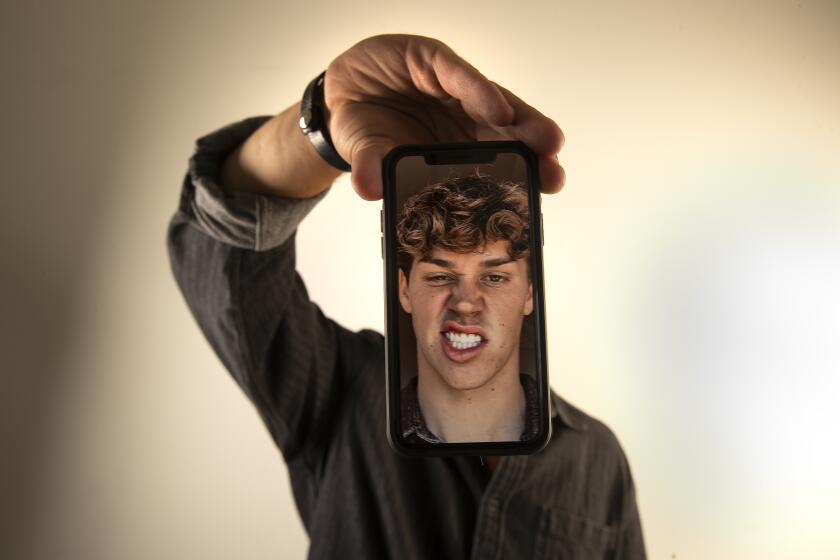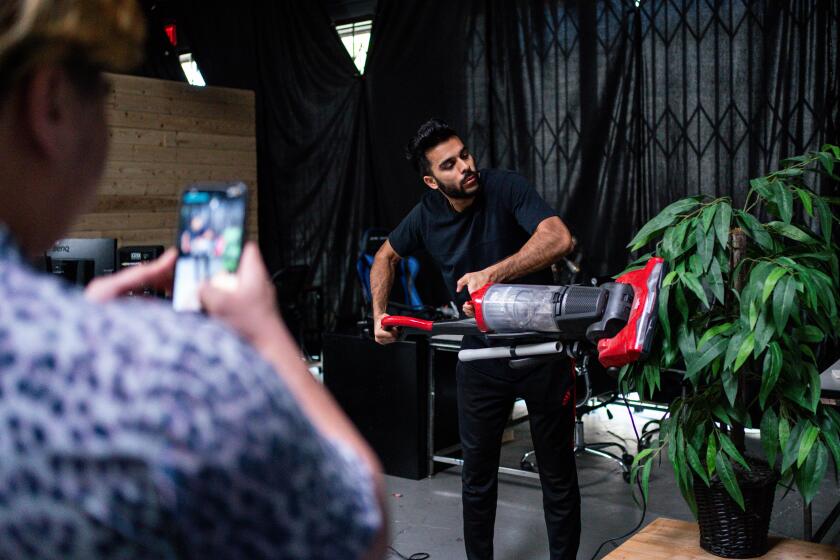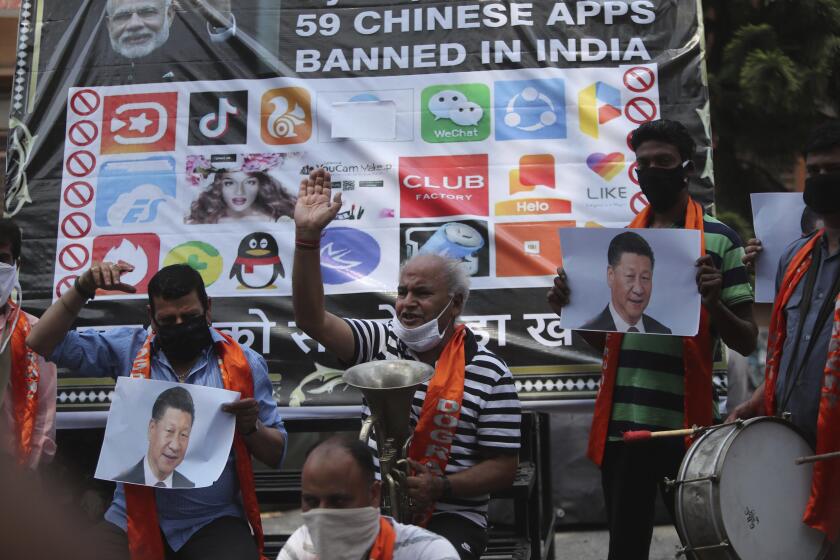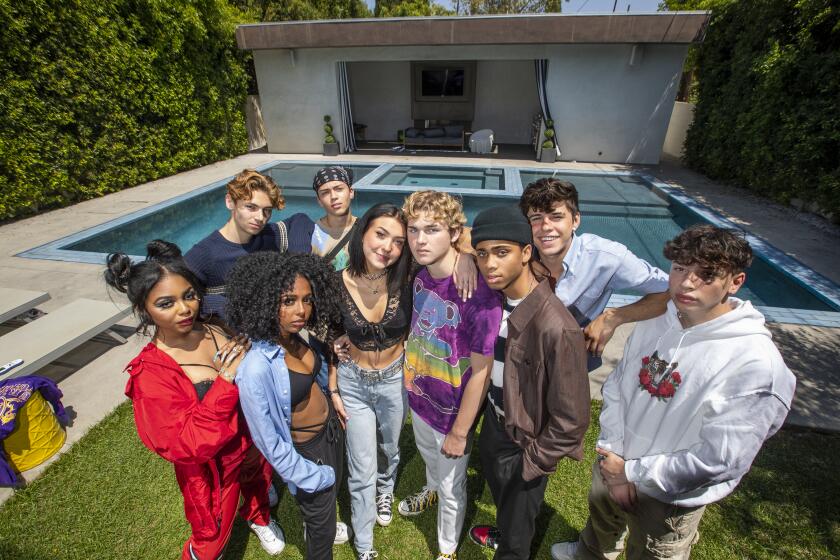This L.A.-based app aims to be the new TikTok. How it’s thriving amid Trump’s attempted ban
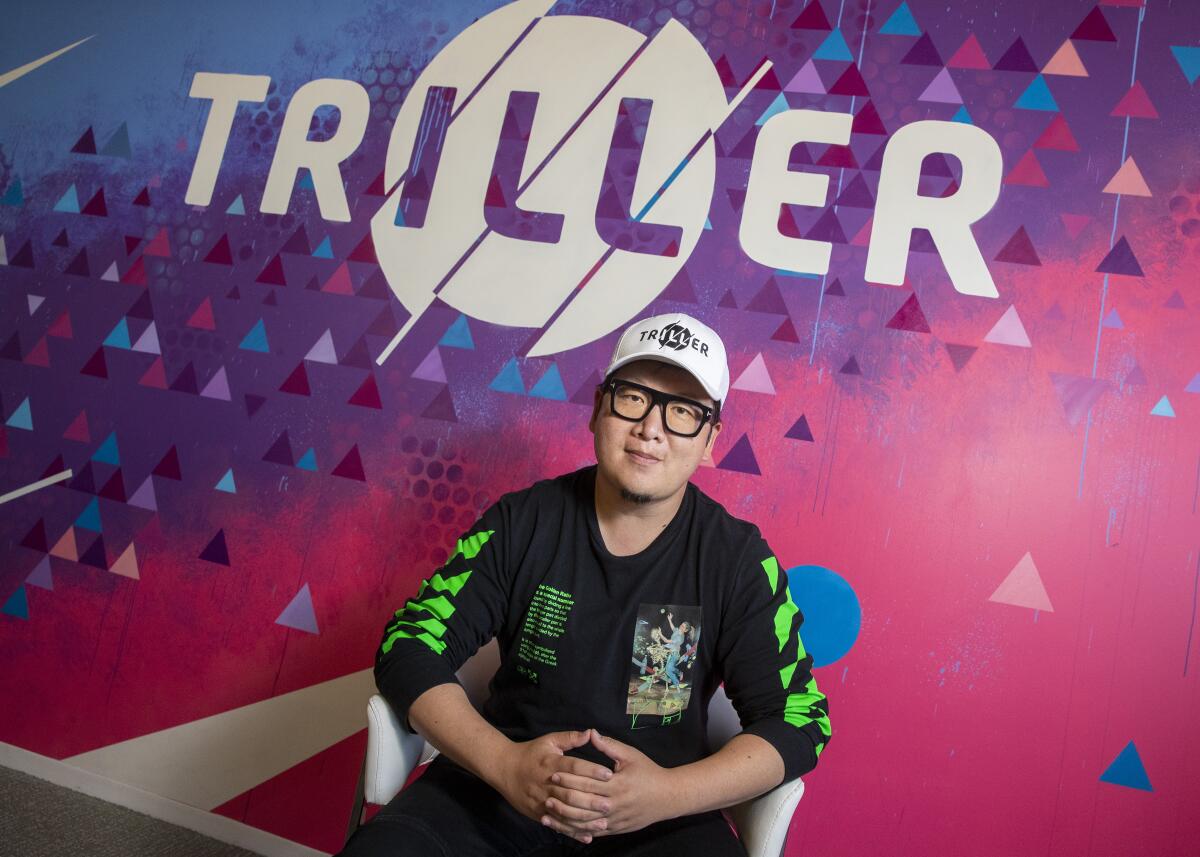
- Share via
It was the moment this Hollywood startup had long been waiting for.
When the future of TikTok was imperiled by President Trump’s executive order on Thursday, a previously obscure Century City-based rival was poised to reap the benefits.
“We are absolutely positioned to be a replacement for TikTok if they do get banned,” said Triller CEO Mike Lu on Thursday, mere hours before the executive order was issued. “Out of everyone in this space, we are the most adaptable ... and grounded one in terms of being TikTok’s successor.”
Indeed, the competitor of China-based tech company ByteDance’s TikTok saw its popularity surge before Trump officially set a clock on TikTok’s operations in the U.S.: Triller jumped to the No. 1 downloaded iPhone app in the nation on Aug. 1 (its July low was 845), according to San Francisco-based analytics firm App Annie (on Friday it was at 198). It hit that milestone one day after Trump first floated the notion of a TikTok ban and four days after some of TikTok’s best known stars said they would make Triller their new home — while taking some equity in the 5-year-old company.
TikTok said it was shocked by Trump’s order — which would bar the wildly popular video app’s parent company, ByteDance, from conducting business transactions with other American companies starting Sept. 20 — and would explore all of its options.
“We will pursue all remedies available to us in order to ensure that the rule of law is not discarded and that our company and our users are treated fairly — if not by the administration, then by the U.S. courts,” TikTok said. On Saturday, NPR reported that TikTok plans to file a federal lawsuit in Southern California as early as Tuesday.
Microsoft is in talks to purchase TikTok’s U.S. operations, but there’s still a lot that could go wrong. The tech behemoth could have trouble maintaining TikTok’s cool factor, which has kept creators flocking to the platform. And Trump’s provision that some proceeds from such an acquisition go to the U.S. Treasury could pose legal obstacles, though Microsoft has already signaled a willingness to provide “proper economic benefits to the United States, including the United States Treasury,” in a statement Aug. 2.
And don’t count out competition from Facebook-owned Instagram, which on Aug. 5 unveiled a TikTok-like feature called Reels.
The social video app faces growing scrutiny from the U.S. government, rising competition from rivals like Facebook and the defection of top creators.
But if TikTok stumbles and Instagram Reels flops, Triller could emerge as a big winner — as could Ryan Kavanaugh, the brash executive who owns most of the company through his investment firm, Proxima Media.
A success for Triller would amount to a significant comeback for Kavanaugh, best known previously as head of mini-studio Relativity Media.
Relativity, founded in 2004, made a name for itself co-financing movies like “Bridesmaids” and “The Social Network.” But in 2015, Relativity collapsed in bankruptcy, with nearly $1.2 billion in liabilities and assets worth $560 million amid a series of poorly performing films.
Kavanaugh and Relativity grew to prominence by arranging deals to co-finance movies released by Universal Pictures and Sony Pictures, earning millions in fees in the process. The mogul, known for his charisma, his ability to raise money and his penchant for flying a helicopter to the office, adopted what was characterized as a “Moneyball”-like approach to picking projects. He promised to limit the financial risk of the volatile movie business by betting on pictures that cost less than $100 million and employing algorithms to weed out flops.
But though Relativity boasted early winners such as the Bradley Cooper thriller “Limitless,” it struggled to pay down a heavy debt load, compounded by flops like “Out of the Furnace” and “Earth to Echo.”
In bankruptcy court, a group of creditors bought the company’s television business, its sole hotly desired major asset, for $125 million, and relaunched it as Critical Content. Relativity emerged from bankruptcy in March 2016, but filed once again in 2018, selling substantially all of its remaining assets to a holding company called UltraV.
“Ryan Kavanaugh definitely has the ability to raise money,” said Lloyd Greif, chief executive of Los Angeles investment bank Greif & Co., of the dealmaker’s re-emergence in the entertainment industry. “He certainly is a salesman, and I don’t think that’s changed one iota here.”
Kavanaugh said the lessons from Relativity have made him into a better businessman today. He acknowledged that he made mistakes, chalking them up to youthful hubris.
“I was young and I was flying a helicopter to work, and I was doing all the things that a 20-year-old with too much money probably would do and shouldn’t have done. And on top of being vocal and just saying things in the industry that affect people ... if I met that guy today, I’d be like, ‘What an asshole,’” Kavanaugh said.
Ryan Kavanaugh’s plan to turn around his struggling mini-studio Relativity Media is on shaky ground.
His latest venture, Triller, is on an upward trajectory, Kavanaugh said. The company began as a music video app that launched in 2015, founded by two musicians who wanted an inexpensive way to edit their work without paying to rent studio space, Lu said. It pivoted toward becoming more of a social video app by 2016, but still struggled to gain mainstream traction.
Last year, Proxima Media acquired Triller and became majority owner. Kavanaugh and his Proxima partner, Bobby Sarnevesht, who is also Triller’s chairman, are actively involved in the company. At the same time, Triller purchased United Kingdom-based music and video editing company MashTraxx and integrated both apps, positioning itself as the next big video-sharing service. Music industry luminaries such as the Weeknd, Snoop Dogg and Marshmello invested and encouraged their fans to use the app.
Musicians and record labels use Triller because it gives them another way to reach young fans online and promote new tracks, particularly in hip-hop. Warner Music Group, Sony Music Entertainment and Universal Music Group have licensing deals with Triller, as well as nominal equity stakes — a common arrangement between record labels and startups.
“In a sense, it’s a no-lose for labels looking to promote new music,” said analyst Russ Crupnick, managing partner of research firm MusicWatch. “But at some point you wonder, how many of these things do we need?”
TikTok, a popular based social video app owned by China-based ByteDance, has seen explosive growth this year amid the coronavirus crisis. The company has plans to hire more people, including at its Culver City office.
Meanwhile Triller has taken some heat from David Israelite, president and chief executive of the National Music Publishers’ Assn., who suggested that the company has not fully licensed its music. While it has secured deals with the big record labels, it has not licensed with all music publishers, which represent songwriters, Israelite said.
“You’ve got a company that is trying to build a business on music for which it doesn’t have a license,” Israelite said. “The legitimate film and TV business wouldn’t dream of doing that. It would be an immediate intellectual property lawsuit.”
Lu said becoming fully licensed is a work in progress. So far, Triller said, it has partnerships with music publishing houses Warner Chappell Music, Kobalt Music Group and independent music licensor Merlin, among others.
“There’s so many of them and we want to work with all of them,” Lu said. “We want to make sure all the artists and songwriters, producers all get credit. If we haven’t gone to them, I apologize as the CEO. It’s not because we don’t want to, it’s just that we’re a really small team and we’re trying to go to everyone as quickly as possible.”
Triller employs roughly 150 full-time employees, Lu said, and plans to double its size.
TikTok won’t be easy to dethrone. It has succeeded not just because of the number of downloads it has achieved — nearly 2.1 billion excluding the Chinese version Douyin, according to mobile research firm Sensor Tower — but also because of the amount of time people spend on the app. About 38% of the 500 people polled in a MusicWatch survey said they use TikTok multiple times a day, for an average of 35 minutes each session. Triller says users spend 22 minutes a day on its app.
Back in 2017, Triller had just 2 million active monthly users worldwide and was not seen as a relevant player. But when TikTok was banned in India — due to the government’s national security concerns — Triller’s user numbers exploded. Last month, it had 64 million, Lu said.
The Chinese video-sharing app is booted from its biggest foreign market as India retaliates for a deadly border clash.
Like India, countries including Japan and now the U.S. have expressed concerns over the way TikTok handles user data and whether parent ByteDance could be compelled to give information to the Chinese government. TikTok said it has not given and will not give information to the Chinese government and that its U.S. user data is stored in the U.S. and backed up in Singapore.
Already, the number of times people in the U.S. have installed TikTok on their devices is down 36% for the first six days of August, compared to the same period in July, according to Sensor Tower.
“It’s been very beneficial to us,” Kavanaugh said of TikTok’s troubles, adding that some of the larger app’s influencers are “slowly transitioning over to us ... because they feel a responsibility to their audience and they don’t feel great about what they’re hearing.”
Triller says it stores its user data in the United Kingdom and the U.S. It has no plans to enter China, Kavanaugh said.
The company’s momentum got a further boost when popular U.S. TikTok creators defected to Triller. As Kavanaugh tells the story, 18-year-old Josh Richards and three other creators came to Triller, airing their concerns about how TikTok handles their data and looking to see if Triller could provide an alternative.
Richards, who is now Triller’s chief strategy officer, said he felt that TikTok wasn’t listening to his suggestions on how to improve the ways video creators make money on the platform. He pointed out that TikTok over time has taken a larger cut of the money that creators earn through live streaming.
“It feels kind of like they just don’t care about us,” Richards said. “So that’s why it was so refreshing, when we came to Triller and started talking, that they completely heard all of our ideas.”
Triller announced last month that it was bringing Richards and three other creators on as investors. The company also has a legal case against TikTok, suing for patent infringement. TikTok did not respond to a request for comment.
Still, Triller has a long way to go because it doesn’t have as much content on its platform as TikTok, said Chris Sawtelle, head of digital ventures at ICM Partners. But that could be an opportunity for creators to get discovered more quickly.
“Some of these people are gravitating to Triller as a way to capitalize on that blank canvas of a billboard to make sure that they’re the first on the platform and the first to be seen,” said Sawtelle, who represents TalentX, an influencer management firm where Richards is a co-founder.
Marlene Mendez, a 23-year-old influencer in Bell Gardens, has more than 500,000 TikTok followers, but signed up for Triller when concerns among creators over TikTok started to escalate. She has yet to post a video on her new platform, but sees it as a potential alternative if TikTok is banned.
“If it happens, it happens,” Mendez said. “We do have other platforms to be creative on. It would just be sad because that’s where I started.”
Triller said it has raised nearly $100 million and is in the process of raising an additional $250 million. It makes money through efforts including brand deals and sponsorships; it expects to be profitable this year but declined to disclose its revenue.
L.A.’s TikTok creators earn thousands of dollars a month. Trump’s threat of a potential ban has them concerned.
But it’s not the only app that stands to gain from TikTok’s predicament.
Instagram has a built-in audience of more than 1 billion monthly active users that it can funnel to its new Reels feature.
Brendon McNerney, a 31-year-old entrepreneur who got his start on the short-lived Vine, recently launched his own short-form video app Clash to cater to online creators. As the Trump administration’s attacks on TikTok escalated last month, he and a small team scrambled to get Clash into the app store. “I kind of got some flashbacks to when Vine shut down,” McNerney said.
TikTok is also trying to keep creators on its platform by announcing a $200-million creator fund in the U.S. that will grow to more than $1 billion in the next three years.
For now, Lu says, he hasn’t slept much, and he spent the first weekend in August making sure Triller’s servers could take the sharp rise in users.
“We’re just very much heads down, focused on building and providing a great tool, a great product for our customers,” Lu said. “We’re not really even celebrating at present. It’s just making sure that we can keep this one step at a time.”
More to Read
Inside the business of entertainment
The Wide Shot brings you news, analysis and insights on everything from streaming wars to production — and what it all means for the future.
You may occasionally receive promotional content from the Los Angeles Times.
